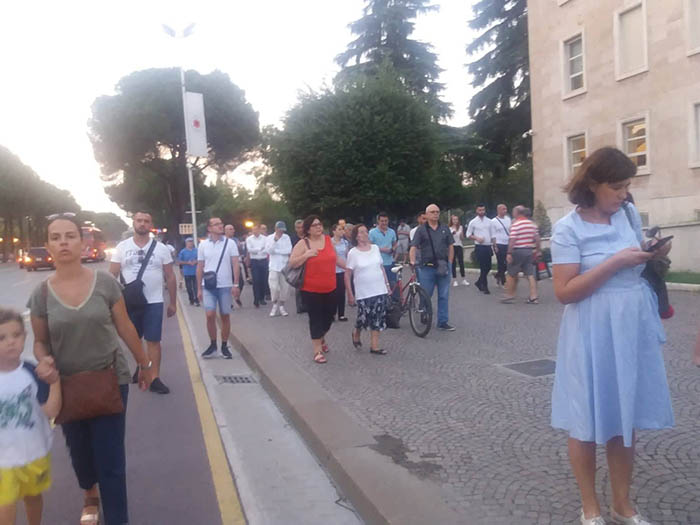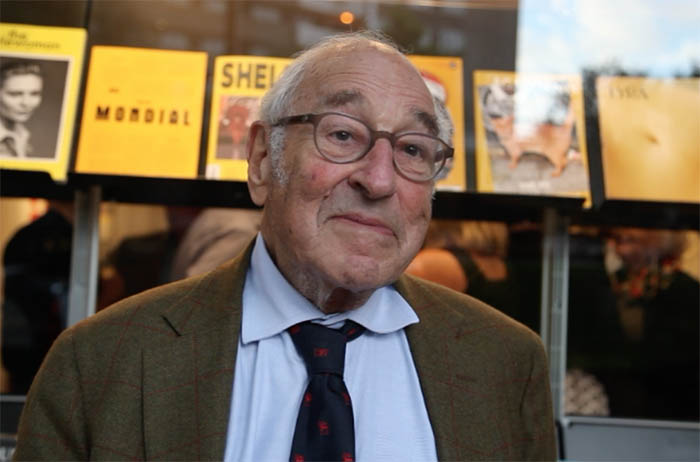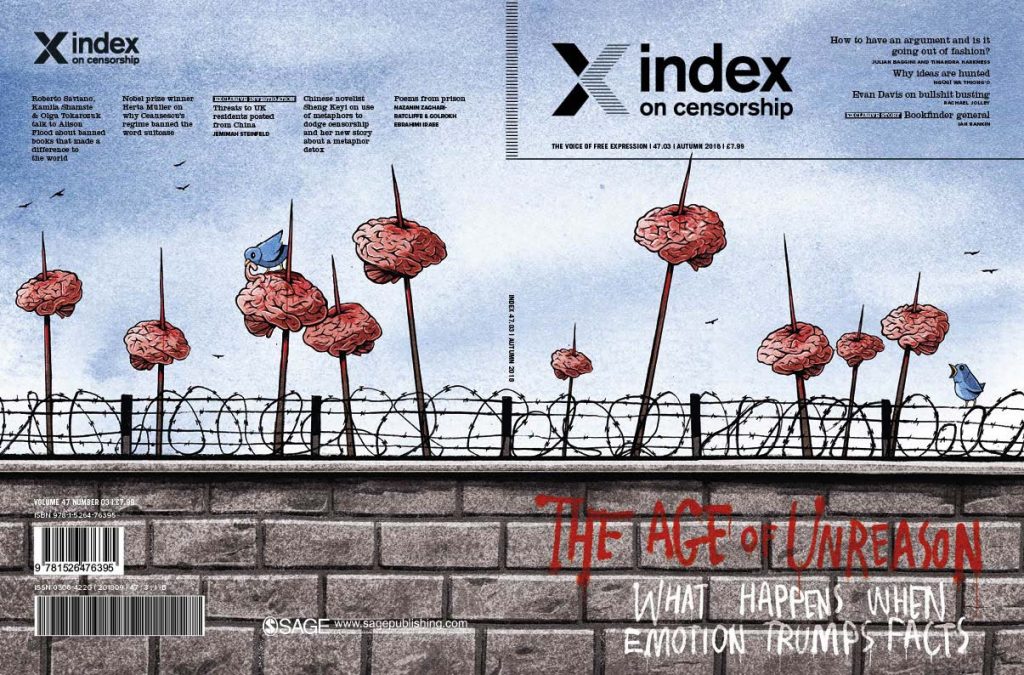Журнализм в изгнании: Редактор прибегает к социальным средствам массовой информации в попытке надавить на правительство Азербайджана
[vc_row][vc_column][vc_custom_heading text=”«Общение между журналистами, которые находятся за рубежом, – важно»”][vc_single_image image=”56243″ img_size=”full” add_caption=”yes”][/vc_column][/vc_row][vc_row][vc_column][vc_column_text]
Рахим Хациев, в то время действующий главный редактор азербайджанской газеты «Азадлыг» (Azadliq), принимает Награду за Свободу Слова в области журналистики от «Индекса цензуры» (Index on Censorship) в 2014 году (Фото Алекса Бреннера для «Индекса Цензуры»)
В тот вечер, когда Рахим Хациев принимал Награду за Свободу Слова в области журналистики (спонсор номинации газета «Зе Гардиан» (The Guardian)), он поднял высоко над головой копию газеты, которая выстояла несмотря на нападки со стороны правительства, чьи злодейства она освещала. Это был март 2014 года и Хациев, действующий главный редактор независимой азербайджанской газеты «Азадлыг», стоял на сцене в Лондоне. Он триумфально провозгласил: «Команда газеты решительно настроена продолжать эту священную работу – служить правде. Потому что в этом смысл того, что мы делаем, и смысл нашей жизни».
Четыре месяца спустя эта миссия была поставлена под угрозу запугиваниями, арестами и финансовыми ущемлениями за репортажи о правительственной коррупции. И это не впервые «Азадлыг» столкнулся с экономическим давлением со стоны дистрибьюторов, поддерживаемых правительством во главе с его лидером (четырежды избираемым на этот пост) Ильхамом Алиевым. Алиев обвиняется в авторитарном правлении и подавлении инакомыслия со времен вступления в должность в 2003 году.
Месяцы штрафов, превосходящих 50 000 фунтов стерлингов, и множественные аресты подавили газету, и она приостановила свое печатное издание в июле 2014 года. Среди других представителей гражданской общественности и независимых СМИ, обозреватель Сеймур Хези, коллега Хациева, пребывает в заключении за «отягчающий обстоятельства хулиганизм», проявленный им в попытке защитить себя от физического нападения. Множественные общественные протесты не были услышаны правительством.
Что касается этого года, то согласно индексу свободы прессы, составляемого «Репортёрами без границ», в данное время в Азербайджане в заключении находятся 165 журналистов. Ежемесячно в базе данных проекта «Маппинг Медиа Фридом» (Mapping Media Freedom), который следит за свободой СМИ, регистрируются доклады о насилии над инакомыслием в бывшей советской республике. Только в июле 2018 года в базе данных было зарегистрировано четыре заблокированных правительством за распространение дезинформации веб-сайта, допросы руководством двоих редакторов независимых новостных изданий и один арестованный за неповиновение полиции журналист.
В декабре 2017 года Высший Суд Азербайджана поддержал блокировку пяти независимых новостных веб-сайтов, включая Azadliq.info, действующий с марта 2017. Хациев раскритиковал этот шаг и охарактеризовал его как дополнительное препятствие для азербайджанского народа на пути к объективной информации.
Проживая в ссылке в западной Европе с 2017 года, Хациев рассказывал «Индексу»: «Четверо сотрудников нашего сайта в тюрьме. Их обвинили в хулиганстве и незаконных финансовых операциях. Их всех арестовали по сфабрикованным обвинениям. Все обвинения выдуманные».
Пребывая за рубежом, Хациев курирует страницу газеты в «Фейсбуке», пока она обновляется и есть в свободном доступе для читателей за пределами Азербайджана. Касательно нынешней ситуации в сфере свободы слова в родной стране, он говорил: «Ситуация в стране очень тяжелая. Власти продолжают притеснять демократически настроенных людей. Продолжаются аресты политических активистов и журналистов».
Хациев разговаривал с Шреей Парджан о текущей ситуации.
«Индекс»: «Азадлыг» единственная мишень? Почему её публикации воспринимались как такая угроза правительству?
Хациев: Мы не можем сказать, что только «Азадлыг» подверглась репрессиям. Азербайджанские власти очень коррумпированы, и они не терпят критики со стороны оппонентов. Коррумпированные и репрессивные режимы по всему миру подавляют свободу слова. В этом отношении власти Азербайджана, особенно в последнее время, находятся в рядах наиболее репрессивных в мире.
«Индекс»: Что заставило вас в конечном итоге решится покинуть Азербайджан и насколько сложным был этот процесс?
Хациев: Газета прекратила свою деятельность в сентябре 2012 года. Власти не разрешили «Азадлыг» печататься. В то время они не тронули сайт газеты. Я оставался в стране еще некоторое время. Мне жаль, что мне пришлось покинуть Азербайджан, но власти оказывали на меня очень сильное давление. Мои коллеги продолжали руководить веб-сайтом и страницей газеты в «Фейсбуке». Конечно, это трудный процесс. Быть вынужденным покинуть страну – очень неприятно. Мне пришлось пережить много проблем. Несмотря на это, я продолжал дело.
«Индекс»: Пока вы в ссылке, как вам удается продолжать работу и добиваться изменений?
Хациев: Во время ссылки я продолжаю руководить веб-сайтом и страницей газеты в «Фейсбуке». Находясь за пределами страны, я активно использую социальные сети. С одной стороны, я собираю информацию, а с другой стороны, я ее распространяю. Социальные сети помогают организовать работу и руководить ей. Наша страница в «Фейсбуке» одна из самых популярных в стране, и я горжусь нашим достижением.
«Индекс»: Могли бы вы указать на какие-то сообщества, оказавшие вам поддержку в ссылке? Какие обязанности существуют в иностранных корреспондентов касательно сотрудничества и поддержки друг друга в кризисные времена?
Хациев: Общение между журналистами, которые находятся за рубежом, – важно. Очень полезно делиться и опытом, и информацией. Было бы очень хорошо поговорить о работе с местными журналистами.
«Индекс»: Как подавление цифровой свободы противостоит правительственной истории о современном, свободном Азербайджане?
Хациев: Политический режим в Азербайджане сильно подавляет свободу слова. Согласно индексу свободы прессы, составляемого «Репортёрами без границ», Азербайджан занимает 163 место. В настоящее время страна переживает один из наиболее трудных периодов своей истории. Права и свободы граждан долго носили номинальный характер. В данное время в стране более 160 политических узников.
[/vc_column_text][/vc_column][/vc_row]



